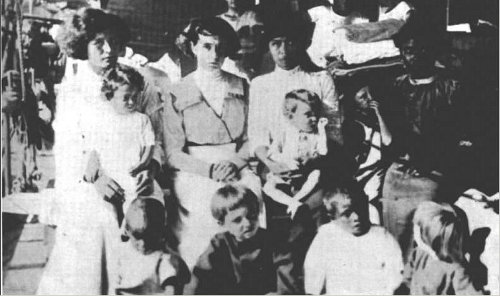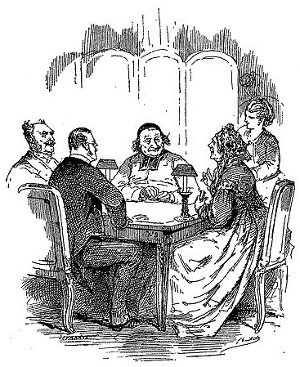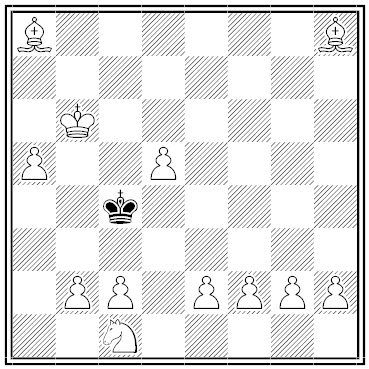“Bad officials are elected by good citizens who do not vote.” — George Jean Nathan
Author: Greg Ross
The Clipperton Survivors

On July 18, 1917, the U.S. Navy gunboat Yorktown called at Clipperton Island, a tiny coral atoll in the eastern Pacific. The ship’s commander, Harlan Page Perrill, sent two men ashore and was surprised to see them return with a complement of women and children. When his men made their report, Perrill later wrote, they revealed “a tale of woe absolutely harrowing in its details.”
The three women and eight children were the only survivors of the island’s original colony, which had once numbered 100. The last ship had visited the island three years ago, and their supplies had given out six months after that. Since that time they had survived on fish, fowl, and eggs. Scurvy and starvation killed much of the population; others died at sea while attempting to escape in a whaleboat. By 1917 lighthouse keeper Victoriano Álvarez was the only man on the island; he declared himself king and began terrorizing the women, threatening, beating, and sadistically raping them, even killing two.
Álvarez had promised to kill Alicia Arnaud, the governor’s wife, when help finally arrived, to prevent her talking to the authorities, but an odd quirk saved her. That very morning, finally determined to act, she and fellow survivor Tirza Randon had confronted Álvarez in his hut, where Randon had killed him with a hammer. Only minutes later, Arnaud’s son had spotted the Yorktown. “What if we had been an hour earlier!” Perrill reflected. “It is almost certain that the man would have killed Señora Arnaud.”
Risking court-martial, Perrill left Álvarez’s body to be devoured by crabs and omitted any mention of him in his official report, and he and the entire crew of the Yorktown kept the secret for 17 years. He later explained that “I was afraid of the effects it might have upon the fortunes of Tirza Randon.” “Had Perrill not sanitized his reports and included titllating details of Álvarez’s reign of terror,” wrote Jimmy Skaggs in his history of the island, “the story undoubtedly would have received far greater attention.”
A Double Mnemonic
George the Third said with a smile,
“Seventeen sixty yards to a mile.”
This gives two unrelated pieces of information: the date of George’s accession and the number of yards in a mile.
Free Enterprise
A man and a boy go into a barbershop.
After getting his haircut, the man says, “Now cut the boy’s hair too. I’ll be back soon.”
When he’s finished cutting the boy’s hair, the barber says, “When is your father coming back to pay?”
The boy says, “He’s not my father. He met me in the street and asked if I wanted a free haircut.”
(From Sion Rubi, Intelligent Jokes, 2004.)
Black and White
Burrowed Time
In September 1924, the wheels of a truck sank into the ground behind the Pelham Courts apartments in Washington, D.C. On investigating, the building’s manager and janitor discovered a mysterious brick-lined passageway that led to a bizarre network of concrete tunnels extending as much as 32 feet underground.
The discovery put Washington into two days of wild speculation. Was this a German plot? A relic of the Civil War? But then Smithsonian Institution entomologist Harrison G. Dyar came forward to admit that he had dug the tunnels when had lived in the capital 10 years earlier. From Modern Mechanix, August 1932:

Dyar’s obsession had begun innocently enough. He told the Washington Star that in 1906 he had dug a flowerbed for his wife, and “When I was down perhaps six or seven feet, surrounded only by the damp brown walls of old Mother Earth, I was seized by an undeniable fancy to keep on going.” He had continued the project in secret for 10 years, stopping only in 1915, when he moved out of the area.
“I did it for exercise,” he told the New York Times. “Digging tunnels after work is my hobby. There’s really nothing mysterious about it.”
(Thanks, Allyson.)
Pain Puzzles
Where is pain? If my foot hurts, it’s natural to say that the pain is located in my foot, that I’m perceiving something outside my mind in the same way that I might see a rainbow or smell a rose. The same is true of itches, tickles, tingles, and other bodily sensations.
But this is troubling — suppose I discover that my foot has been amputated, and that the pain exists only in a “phantom limb.” Was I then mistaken? The pain certainly exists somewhere; it seems impossible to be wrong about that. You may convince me that the rainbow is an illusion or the rose an hallucination, but it seems absurd to suggest that one’s experience of pain is mistaken. (Inversely, pain can’t exist without someone’s feeling it. If you anesthetize me and drop a hammer on my foot, the pain isn’t somehow hidden from me — it doesn’t exist at all.)
So pain is strangely private and incorrigible — only I can know whether I’m feeling it, and I cannot be wrong about this impression. It would seem that I can have such authority only if the pain is really in my head. But “it is perfectly OK with common sense that we may have sensations in body parts other than the head — say, under our right foot! Why?” asks University of British Columbia philosopher Murat Aydede. “This, then, is another puzzle about pains and other intransitive bodily sensations: how to properly understand the common practice of locating what appear to be essentially subjective and private sensations in various parts of the body.”
(Murat Aydede, Pain: New Essays on Its Nature and the Methodology of Its Study, 2005.)
In a Word
analphabet
n. one who cannot read
Upstanding
Abraham Lincoln’s former law partner, William Henry Herndon, published a biography of the president in 1889. While gathering material for the project, he received this letter from a colleague:
Dear Herndon:
One morning, not long before Lincoln’s nomination — a year perhaps — I was in your office and heard the following: Mr. Lincoln, seated at the baize-covered table in the center of the office, listened attentively to a man who talked earnestly and in a low tone. After being thus engaged for some time Lincoln at length broke in, and I shall never forget his reply. ‘Yes,’ he said, ‘we can doubtless gain your case for you; we can set a whole neighborhood at loggerheads; we can distress a widowed mother and her six fatherless children and thereby get for you six hundred dollars to which you seem to have a legal claim, but which rightfully belongs, it appears to me, as much to the woman and her children as it does to you. You must remember that some things legally right are not morally right. We shall not take your case, but will give you a little advice for which we will charge you nothing. You seem to be a sprightly, energetic man; we would advise you to try your hand at making six hundred dollars in some other way.’
Yours,
Lord
The Paradox of the Second Ace

You’re watching four statisticians play bridge. After a hand is dealt, you choose a player and ask, “Do you have at least one ace?” If she answers yes, the chance that she’s holding more than one ace is 5359/14498, which is less than 37 percent.
On a later hand, you choose a player and ask, “Do you have the ace of spades?” Strangely, if she says yes now the chance that she has more than one ace is 11686/20825, which is more than 56 percent.
Why does specifying the suit of her ace improve the odds that she’s holding more than one ace? Because, though a smaller number of potential hands contain that particular ace, a greater proportion of those hands contain a second ace. It’s counterintuitive, but it’s true.

